Activity Level: Above Average
Hypoallergenic: No
Social Ability: Friendly
Skills: Sporting, Hunting
Intelligence: Above Average
Ideal Climate: Temperate to Cold
Though the Poodle may look prim and proper, under all their fluffy fur is a muscular body built for hunting and sporting. Standard Poodle dogs have been companions, hunting helpers, and show dogs for decades, and their history is believed to date back to the Middle Ages.
Breed Overview
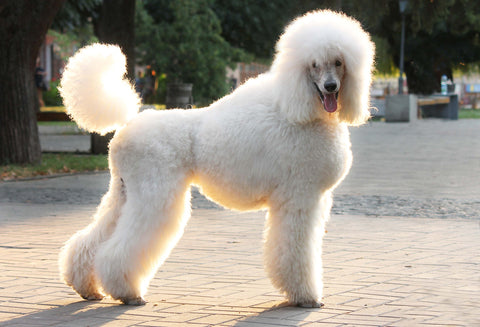 Origin: Images of Poodle-like dogs have been found on ancient Roman and Egyptian artifacts dating back to the early centuries of the Common Era. However, there is no way to prove or disprove which canine breed was depicted. In more recent times, the Fédération Cynologique Internationale (International Dog Federation) believes that the Poodle breed originated in France, but there is not a general consensus.
Origin: Images of Poodle-like dogs have been found on ancient Roman and Egyptian artifacts dating back to the early centuries of the Common Era. However, there is no way to prove or disprove which canine breed was depicted. In more recent times, the Fédération Cynologique Internationale (International Dog Federation) believes that the Poodle breed originated in France, but there is not a general consensus.
Some records place them in Germany, which makes sense considering the waterdog’s name; in German, they are called “Pudel” which means ‘to splash,’ a fitting moniker for a waterfowl hunter. On the other hand, French records name the breed as ‘caniche’ meaning “duck dog” and believe it descended from the African Barbet breed after it was imported to Europe. While we may never know the true origin of the Poodle, their official history tells the tale of an under-appreciated breed, a struggling population, and the comeback story of the century.
History: After decades (possibly centuries) working and hunting all over Europe, Poodles were accepted into the Kennel Club of the United Kingdom in 1874 and the American Kennel Club in 1886, both shortly after their respective inceptions. By this time in the nineteenth century, most regions and cultures in America and Europe already had their go-to canine breeds for hunting, working, and herding. Breeds such as Mastiffs and Hounds had been a staple among the pre-industrial western world for decades before the Poodle showed up, so these fluffy newcomers sunk in popularity. However, in 1935 a Poodle won the Westminster Dog Show, and would slowly but steadily grow in popularity until they were the top canine breed in the UK less than thirty years later.
The American 1960’s saw a boom of luxury and picturesque dogs, even so far as ‘Poodle skirts’ being a staple among young women’s fashion. Poodles were one of many canine breeds that remained popular over the years, as they were valued for their calm temperament, useful skills, and sweet personalities. Luckily, the next several decades would find Poodle populations stabilize, and they remain beloved house pets and companions to this day. Today, standard Poodles can be found working as hunting canines, in loving homes, and even fulfilling service tasks, but many are still in shelters. If you are thinking about adding a Poodle to your family, we recommend adopting from a local animal rescue or checking out any of these fine organizations: Poodle Club of America, PCA Rescue Foundation, United Poodle Association.
Breed Attributes
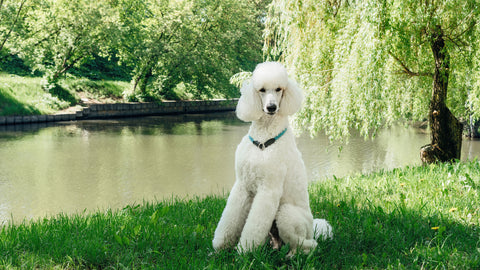 Temperament: As hunting dogs, Poodles tend to be calm and vigilant. Their instinctual desire to watch their surroundings isn’t only for catching the odd rabbit in the backyard, however. Staying aware of what is around them contributes to their comfort in their environment and their confidence in their home.
Temperament: As hunting dogs, Poodles tend to be calm and vigilant. Their instinctual desire to watch their surroundings isn’t only for catching the odd rabbit in the backyard, however. Staying aware of what is around them contributes to their comfort in their environment and their confidence in their home.
Poodles can be quite vocal, but with good reason; these vigilant canines are often on-guard, and they will likely respond to sudden stimulus such as a doorbell with barking and excitement. Their watchdog nature should be encouraged, as it helps them feel comfortable and safe in their environment. Unwanted reactions, such as jumping or running when a visitor calls, can be managed with training. As they are hunting dogs with the potential for highly specialized training, professional guidance is recommended.
Personality: While every dog is unique, a Poodle personality tends to be relaxed while also alert and eager. With plenty of training, a healthy amount of daily exercise and play, and a safe environment, Poodles can thrive and adapt to just about anything. These intelligent dogs often enjoy the company of others, though Poodles are not known to be good with children. Their size, strength, and speed can be intimidating, so it is recommended to train your dog as well as teach children how to play with and respect animals before meeting.
Ideal Owner: You! Poodles are fiercely loyal companions with a penchant for following orders. Whether you’re looking for a furry friend to follow you around or a sporty pup to run with, a Poodle is a great choice.
Fur Care
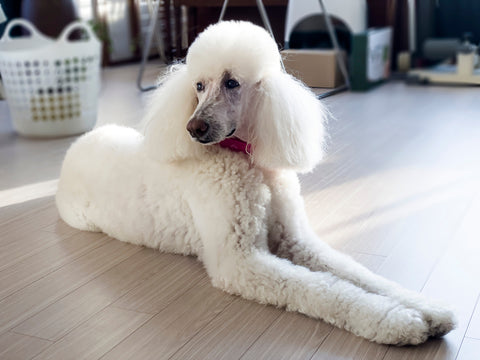 Grooming: All types of Poodles have thick, curly coat, which requires a high level of maintenance. Regular brushing helps remove dead skin and loose fur, which can get caught in the web of curls before falling out. Grooming professionals often recommend using a thick bristled brush for dogs with very thick hair to help prevent matting and tangles.
Grooming: All types of Poodles have thick, curly coat, which requires a high level of maintenance. Regular brushing helps remove dead skin and loose fur, which can get caught in the web of curls before falling out. Grooming professionals often recommend using a thick bristled brush for dogs with very thick hair to help prevent matting and tangles.
Bathing and conditioning the coat cannot be ignored when it comes to the handsome Poodle. Their fur needs to be cleansed and hydrated, more so than dogs with shorter or thinner fur. A moisturizing shampoo such as our Oatmeal Aloe Poodle Shampoo replenish moisture to the skin and supports hair strength. To avoid over-grooming and drying their fur out, simple grooming wipes help keep them clean with no bath needed.
Shedding: Lucky for your vacuum, Poodles shed less than the average dog. However, poor skin health can contribute to excessive shedding. Veterinarians recommend adding omega 3 fatty acids to a dog’s diet to support skin hydration and coat strength, which is especially important for a Poodle’s unique coat. Rather than their fur falling out at a certain length like most dogs’, their fur will continue to grow to immense lengths if left untrimmed. A professional groomer can help you choose the best cut for your Poodle, as there are a few different styles with different benefits.
Due to their thick, dense fur, Poodles are very sensitive to heat. Temperatures above 90 degrees Fahrenheit can be life-threatening, as they cannot effectively cool themselves quickly enough. Be sure to monitor your dog’s panting when it’s warm outside, and always have fresh water available for them.
Due to their shedding, Poodles standard and toy are not hypoallergenic. Most veterinarians agree that because all dogs shed to some degree, no dog is truly hypoallergenic.
Health
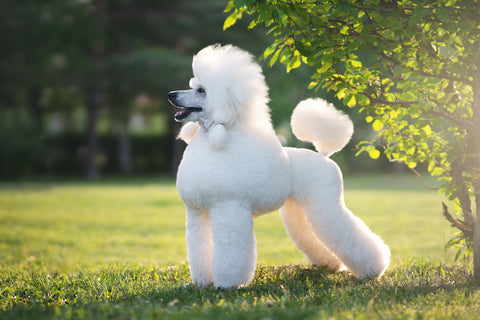 Common Issues: While the Poodle Health Registry lists over fifty health disorders for the breed, that number is actually low when compared to other canines. They are generally healthy dogs with no Poodle-specific health concerns. Unfortunately, purebred Poodles are often susceptible to congenital illnesses due to inbreeding.
Common Issues: While the Poodle Health Registry lists over fifty health disorders for the breed, that number is actually low when compared to other canines. They are generally healthy dogs with no Poodle-specific health concerns. Unfortunately, purebred Poodles are often susceptible to congenital illnesses due to inbreeding.
Efforts to produce ideal show dogs in the mid-twentieth century led to a massive increase in genetic disease prevalence among Poodles. Sebaceous Adenitis and Addison’s Disease are two of the most common conditions these canines may be susceptible to. The former is a skin condition causing a waxy build-up on the coat, and the latter is an endocrine disorder. Both of these must be evaluated by a veterinarian, who can also tell you more about your dog’s specific health concerns.
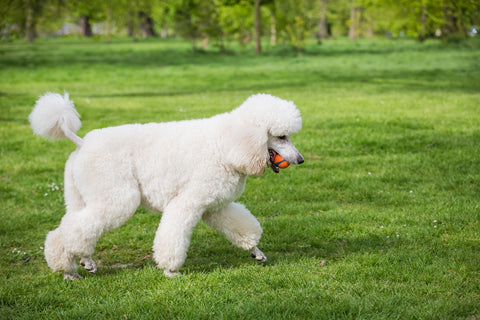 Thanks to decades of responsible breeding, most Poodles live long and healthy lives. Poodle health problems may be few, but that doesn’t mean veterinarian visits can be forgone. Be sure to check in with your vet regularly and ask about your pet’s risk factors.
Thanks to decades of responsible breeding, most Poodles live long and healthy lives. Poodle health problems may be few, but that doesn’t mean veterinarian visits can be forgone. Be sure to check in with your vet regularly and ask about your pet’s risk factors.
Nutrition: All canines need high-quality sources of protein in their diet, which can come from meats such as poultry, beef, and fish. Their food should also include added vitamins and minerals, but most commercial pet foods do not contain enough of certain vitamins to support their daily needs. To boost their nutritional intake, veterinarians recommend a canine multivitamin for all adult dogs. For older pups, a multivitamin supplement made for seniors provides specific nutrients they need in the later stages of life.
Lifespan: 10-18 years
Physical Activity
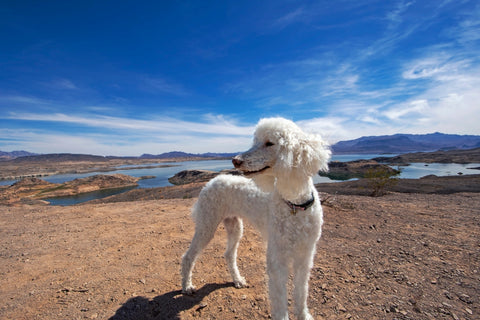 Training: Poodles, having been bred as hunting and sporting dogs for decades, are incredibly trainable. With professional guidance, Poodles can be trained to hunt, sport, perform service, swim, and even respond to hand signals. Their skills are best showcased in the water, where they can run quickly and snatch waterfowl efficiently. Though your Poodle may chase after prey on their own, owners must always properly train and prepare their dog before taking them hunting.
Training: Poodles, having been bred as hunting and sporting dogs for decades, are incredibly trainable. With professional guidance, Poodles can be trained to hunt, sport, perform service, swim, and even respond to hand signals. Their skills are best showcased in the water, where they can run quickly and snatch waterfowl efficiently. Though your Poodle may chase after prey on their own, owners must always properly train and prepare their dog before taking them hunting.
Obedience training is essential for all dogs, and possibly more so for intelligent breeds such as Poodles. Because they are so smart and aware, they can be willful and even sassy, if they do not regard their owner as their leader. Once they understand the hierarchy in the home, their behavior tends to improve.
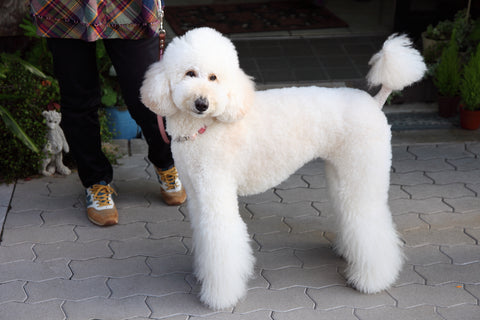 Exercise: All dogs need consistent exercise and outside time every day to stay healthy, active, and content. Exercise is not only important for physical health but mental health as well. Giving your pet an outlet for energy and a way to tucker themselves out helps manage their behavior and anxiety. Outbursts of unwanted, energetic, or destructive behavior may stem from a need for more interaction, play, and movement. Be sure to give your Poodle plenty of time outdoors and plenty of active toys to play with.
Exercise: All dogs need consistent exercise and outside time every day to stay healthy, active, and content. Exercise is not only important for physical health but mental health as well. Giving your pet an outlet for energy and a way to tucker themselves out helps manage their behavior and anxiety. Outbursts of unwanted, energetic, or destructive behavior may stem from a need for more interaction, play, and movement. Be sure to give your Poodle plenty of time outdoors and plenty of active toys to play with.
Specifically for hunting and sporting dogs, fetching toys and other prey analogs are often their favorites. These toys stimulate their instinct to hunt and catch, which can also contribute to their contentment with their playtime.
The average standard Poodle size is on the larger size, which can also contribute to their exercise capabilities. More body mass means more pressure on their joints during activity, but luckily this can be managed with minor lifestyle adjustments and joint support supplements in their diet. By providing a consistent source of essential nutrients, supplementation is a great option for dogs in need of a nutritional boost.

Poodles make outstanding companions, whether you’re on a walk in the park, playing outdoors, or cuddling on the couch. With intelligent minds and sweet personalities, these canines prove to be more than fluffy faces.

